‘French Murdoch’ sparks fears of far-right lurch at iconic paper
PARIS — French conservative media tycoon Vincent Bolloré’s influence on France’s media landscape is raising concerns — again.
For the second weekend in a row, French readers won’t find their traditional reading at newsstands or online, as journalists at the flagship Sunday newspaper Le Journal du Dimanche (JDD) have been on strike following the appointment of a controversial editor.
The naming of right-wing personality Geoffroy Lejeune as the publication’s top editor has stirred outrage not only in the newsroom, but also among politicians and a broad swath of intellectuals and celebrities, including filmmaker Nicole Garcia and the rapper and producer JoeyStarr, who are worried that the influential mainstream newspaper will become a mouthpiece for the far right.
A proud friend of Marine Le Pen’s niece Marion Maréchal, the 34-year-old Lejeune openly backed far-right presidential candidate Eric Zemmour in last year’s campaign.
“It’s almost a provocation,” Céline Calvez, a lawmaker from President Emmanuel Macron’s Renaissance party, told POLITICO. The media executive just lost his top job at anti-immigration magazine Valeurs Actuelles precisely for leaning too far to the right, she said.
Bolloré’s Vivendi group will soon become the JDD’s only shareholder when the acquisition of publishing group Lagardère is completed. Earlier this month, the European Commission conditionally cleared the deal amid calls from lawmakers and economists to block it over media pluralism concerns.
For years, the devout Catholic billionaire — dubbed “the French Rupert Murdoch” — has been accused of turning TV channels, radio stations and newspapers he buys into opinion media leaning well to the right, focusing mainly on identity issues and culture wars.
Under his ownership, news TV channel CNews has been compared to Rupert Murdoch’s Fox News. Radio Europe 1 and weekly glossy magazine Paris Match are also tilting increasingly to the right as Lagardère is set to fall under Vivendi’s full control. Bolloré, however, has consistently denied he provides editorial input to his media outlets.
French Murdoch’s ideological ‘obsessions’
When Geoffroy Lejeune was Valeurs Actuelles’ top editor, the far-right magazine lost a case accusing the publication of racist public insult in 2022 after a drawing depicted a Black lawmaker as a slave. During the presidential campaign that same year, the magazine openly backed Eric Zemmour.
Under Lejeune’s tenure the magazine under-performed financially, reportedly losing advertisers, 10 percent of its subscriber base and half of its online visitors.
According to Jean-Marie Charon, a media sociologist and former adviser at the culture ministry, there is one major difference between Murdoch and Bolloré: While the Australian media tycoon has backed right-wing opinions on Fox News to increase audience and make more money, the French mogul’s move is likely inspired by ideology, as a far-right editorial line is not necessarily going to make his media more profitable.
Bolloré “seems to be putting his political obsessions even ahead of an economic vision,” Charon said.
Media concentration in the hands of major industrialists is not new in France, he added, and French industrial powerhouses have long controlled big media conglomerates given the sector’s need for capital. “What’s different with Bolloré is that he’s much more extreme, ultra-conservative — some might say far right.”
This week, lawmakers from Macron’s party backed JDD reporters, but the government has been more cautious despite reportedly fraught relations between Bolloré and the French president.
Culture Minister Rima Abdul Malak hinted that France’s “republican values” were in danger. Bombarded by parliamentary questions, spokesman Olivier Véran stressed: “It’s not for the state to interfere in newsroom choices in the private sector,” but added the government was open to more media pluralism guarantees.
Brussels watching
The controversy around Lejeune’s appointment comes less than a month after Brussels provisionally rubber-stamped Bolloré’s controversial takeover of Lagardère.
The European Commission’s approval will be effective only after Vivendi divests its publishing branch Editis and gossip magazine Gala. Technically, the media tycoon does not fully own the JDD yet.
A Commission spokesperson said that, before the news about Lejeune broke, the EU’s executive branch was already “looking into” allegations that Bolloré acted before getting the EU nod as if he had total control over Lagardère — a practice known as “gun-jumping” that can lead to fines. A Vivendi spokesperson stressed the company respected merger rules and will continue to do so until the final green light.
This week, Arnaud Lagardère — head of the Lagardère group — insisted it was his choice and not Bolloré’s to pick Lejeune to lead the JDD.
In the outlet’s newsroom, however, few doubt the conservative billionaire’s hand is behind the move.
“When Lagardère says it’s his decision, it’s obviously not the case,” a reporter from the JDD, who was granted anonymity to talk about a sensitive situation, told POLITICO. “He’s merely the executor of a policy which is Bolloré’s.”
Clea Caulcutt contributed reporting.




